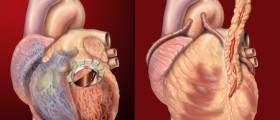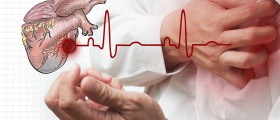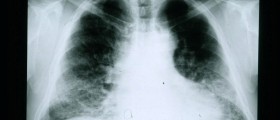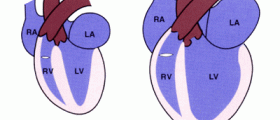The human heart weighs about 7 to 15 ounces or approximately 200 to 425 grams. It is a little bigger than the size of a fist, but this may vary according to your age, size and condition. Athletes and elderly individuals may have larger hearts. Your heart beats at an average of 100,000 times daily, pumping about 7.5 liters or 2,000 gallons of blood to the circulation. It is a powerful, muscular organ that works to deliver oxygen and nutrients to the cells and remove carbon dioxide and other waste products from those cells.
Sometimes, the finding of an enlarged heart is discovered after having a chest x-ray. This is a medical sign known as cardiomegaly, or enlargement of the heart. It does not point to a specific disease, but may be a sign that you have a medical condition that is causing your heart to work harder. Just like the skeletal muscles in your arms and legs, the heart muscle hypertrophies (thickens) when it works harder.
However, in some cases, it is the inner chambers of the heart that become dilated or stretched, resulting in an enlarged heart with thin walls.

Causes Of Heart Enlargement
There are various reasons why the heart becomes bigger in size. These Include:
- High blood pressure (hypertension), which is the most common cause of cardiomegaly. Narrowing or constriction of the blood vessels results in an increased resistance against which the heart must pump blood to the circulation. This causes an increase in the work of the heart, which causes hypertrophy of the heart muscle, leading to heart enlargement.
- Coronary artery disease can cause damage to the heart following a heart attack, which can make the undamaged portions of the heart work harder.
- Heart valve disease may result from rheumatic fever, infections, a heart defect, connective tissue disorders, or certain medications or treatments for cancer (radiation), which can cause your heart to enlarge.
- Diseases of the heart muscle (or cardiomyopathy) may cause thickening and stiffening of the heart muscle.
- A congenital heart condition or a condition you are born with may cause cardiomegaly.
- High blood pressure in the lungs (pulmonary hypertension) makes your heart pump harder, leading to enlargement of the right side of your heart.
- Pericardial effusion (fluid accumulation around the heart) may cause your heart to appear larger on a chest X-ray.
- Chronic anemia (low red blood cell count) causes the heart to work harder to pump more blood to the circulation to compensate for the lack of oxygen in your blood.
- An underactive (hypothyroidism) or overactive thyroid gland (hyperthyroidism) can lead to enlargement of the heart.
- Hemochromatosis (excessive iron in the body) is a disorder that can cause iron build up in various organs, such as the heart. It can cause weakening of the heart muscle and enlargement of the left ventricle.
- Rare diseases that can cause cardiomegaly include amyloidosis, a condition in which abnormal proteins are deposited in the heart and interfere with it normal.
- Arrhythmias or abnormal heartbeat can cause your heart to work hard and enlarge.
When To See A Doctor
Symptoms of heart enlargement may include shortness of breath, chest pain, abnormal heart beat, swelling of the extremities, and fainting. It is best to consult your doctor when you experience these symptoms for proper diagnosis and treatment.
- Texas Heart Institute. Anatomy of the Human Heart. http://www.texasheart.org/HIC/anatomy/anatomy.cfm
- WebMD. Enlarged Heart (Cardiomegaly). http://www.webmd.com/heart-disease/guide/enlarged-heart-causes-symptoms-types
- Mayo Clinic. Enlarged Heart. http://www.mayoclinic.org/diseases-conditions/enlarged-heart/basics/definition/con-20034346
- Photo courtesy of SteadyHealth















